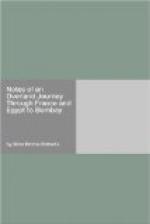We had some shopping to execute, or rather we had to pay for some purchases made by Mohammed for us in the morning, and to return that portion of the goods sent for inspection that we did not intend to keep. We liked the appearance of the shops, which, in all cases of the more respectable kind, were well stocked, whole streets being devoted to the sale of one particular branch of merchandize. A long avenue was occupied by saddlers and the sellers of horse-furniture; another displayed nothing but woollen cloths; a third was devoted to weapons of every description, &c. &c. The wax-chandlers reminded me very much of those in England, being decorated in a similar manner, while the display of goods everywhere was much greater than I had ever seen in Eastern cities, in which for the most part merchandize of the best description is hidden in warehouses, and not to be found without deep research.
The greater number of the streets are covered in with matting in rather a dilapidated state, and having many holes and crevices for the admission of air; this gives to the whole a ragged appearance, and we were told that the Pasha had determined not to allow in future awnings of these frail and unsightly materials. The Frank quarter, which is much better contrived, is the model for subsequent erections. This avenue has a roof of wood sufficiently high to allow of a free circulation of air, and having apertures, at regular distances near the top, to admit the light. The streets in this part of Cairo are wider than usual, and the shops appear to be large and convenient.
All sorts of European manufactures are to be found here, for the most part at reasonable prices. The gentlemen who proposed to cross the desert purchased Leghorn hats of very good quality, and admirably adapted, from their size, lightness, and durability, for Indian wear. Wearied, at length, with the confusion and bustle of the streets, we took again the road to the Citadel, being exceedingly desirous to feast our eyes with the sunset view.
After gazing long and earnestly upon a scene which, once beheld, can never be forgotten, we gladly accepted the offer of Mohammed to show us into the interior of the Pasha’s palace, a large irregular building, having no great pretensions to architectural beauty, and mingling rather oddly the European with the Oriental style. Ascending a broad flight of steps, we passed through a large kind of guard-room to the state-apartments. These were of rather a singular description, but handsome and well adapted to the climate. A third portion, consisting of the front and part of the two sides of each room, was entirely composed of windows, opening a few feet from the ground, and having a divan running round, furnished in the usual manner with pillows at the back. The windows of some of these apartments opened upon gardens, laid out in the English taste and full of English flowers; others commanded the finest prospects of the city and the open space below.




